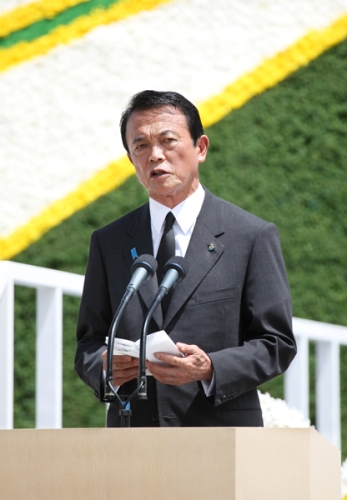 |
 |
 | |
|
Address by Prime Minister Taro Aso |
|
On this occasion of the Nagasaki Peace Ceremony, I reverently offer my prayers to the souls of the atomic bomb victims. I further express my sincere sympathy for those suffering from the after-effects of the atomic bomb. Sixty-four years ago, the people of Nagasaki endured suffering beyond any possible description from the atomic bomb dropped here. Some 70,000 precious lives are said to have been lost in a mere instant. Even those who escaped death were left with scars never to be healed. As we look back now upon Japan's peace and prosperity, we must never forget the precious sacrifices that were made. Japan is the only country to know the devastation actually wrought by atomic bombs. We must expend every possible effort to achieve international peace so that the tragedy of Hiroshima and Nagasaki shall never be repeated. Japan has proposed a resolution on the total elimination of nuclear weapons at the United Nations General Assembly each of the past fifteen years. Against this backdrop, the United States and Russia have recently been advancing negotiations seeking a further reduction in nuclear weapons. The G8 summit referred for the first time last month in L'Aquila to "a world without nuclear weapons" and sent out a robust message which maintains and strengthens the growing momentum for global nuclear disarmament and non-proliferation. Today I again renew the pledge that Japan shall firmly maintain the Three Non-Nuclear Principles and lead the international community towards the total elimination of nuclear weapons and the realisation of eternal peace. For those suffering from the consequences of the bomb, the government has been providing comprehensive support measures covering the areas of health and medical care as well as welfare. I have decided upon a new policy regarding the collective lawsuit on recognising atomic bomb diseases, in consideration of the advanced age of the plaintiffs and the many years they have been pursuing this lawsuit. The main pillar of this policy consists of the very exceptional step by the government of withdrawing its appeal concerning the plaintiffs who prevailed in the ruling from the lower court, and thereby recognising that they are afflicted with atomic bomb diseases. An agreement was reached [with the plaintiffs' group] the other day. The plaintiffs' group, for its part, shall terminate the collective lawsuit on that basis. I consider this agreement to be an extremely welcome development. Moreover, for those who are waiting for recognition as being afflicted with atomic bomb diseases, the government has been working under the principle of granting recognition to as many sufferers as possible. Since April 2008, approximately 4,000 people have been recognised based on a new policy. And in June this year we further expanded the scope of eligibility for recognition in line with a subsequent judicial ruling. We will continue to work to grant recognition as expeditiously as possible based on these new standards for recognition. Furthermore, the revised Law to Support the Survivors of the Atomic Bomb was brought into force last year to make it easier for survivors living overseas to obtain the Atomic Bomb Survivor's Certificate. We will continue to work hard to support as many of the sufferers as possible. I should like to conclude by offering my heartfelt prayers for the repose of the atomic bomb victims' souls as well as my best wishes for the future of the atomic bomb survivors and of the bereaved families, and for the further prosperity of the City of Nagasaki.
|
